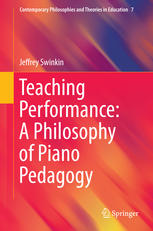

Most ebook files are in PDF format, so you can easily read them using various software such as Foxit Reader or directly on the Google Chrome browser.
Some ebook files are released by publishers in other formats such as .awz, .mobi, .epub, .fb2, etc. You may need to install specific software to read these formats on mobile/PC, such as Calibre.
Please read the tutorial at this link: https://ebookbell.com/faq
We offer FREE conversion to the popular formats you request; however, this may take some time. Therefore, right after payment, please email us, and we will try to provide the service as quickly as possible.
For some exceptional file formats or broken links (if any), please refrain from opening any disputes. Instead, email us first, and we will try to assist within a maximum of 6 hours.
EbookBell Team

4.7
46 reviewsHow can the studio teacher teach a lesson so as to instill refined artistic sensibilities, ones often thought to elude language? How can the applied lesson be a form of aesthetic education? How can teaching performance be an artistic endeavor in its own right? These are some of the questions Teaching Performance attempts to answer, drawing on the author's several decades of experience as a studio teacher and music scholar.
The architects of absolute music (Hanslick, Schopenhauer, and others) held that it is precisely because instrumental music lacks language and thus any overt connection to the non-musical world that it is able to expose essential elements of that world. More particularly, for these philosophers, it is the density of musical structure—the intricate interplay among purely musical elements—that allows music to capture the essences behind appearances. By analogy, the author contends that the more structurally intricate and aesthetically nuanced a pedagogical system is, the greater its ability to illuminate music and facilitate musical skills. The author terms this phenomenon relational autonomy. Eight chapters unfold a piano-pedagogical system pivoting on the principle of relational autonomy. In grounding piano pedagogy in the aesthetics of absolute music, each domain works on the other. On the one hand, Romantic aesthetics affords pedagogy a source of artistic value in its own right. On the other hand, pedagogy concretizes Romantic aesthetics, deflating its transcendental pretentions and showing the dichotomy of absolute/utilitarian to be specious.